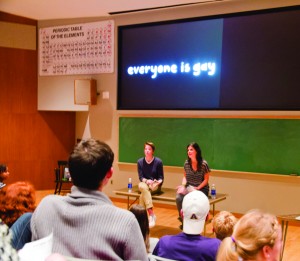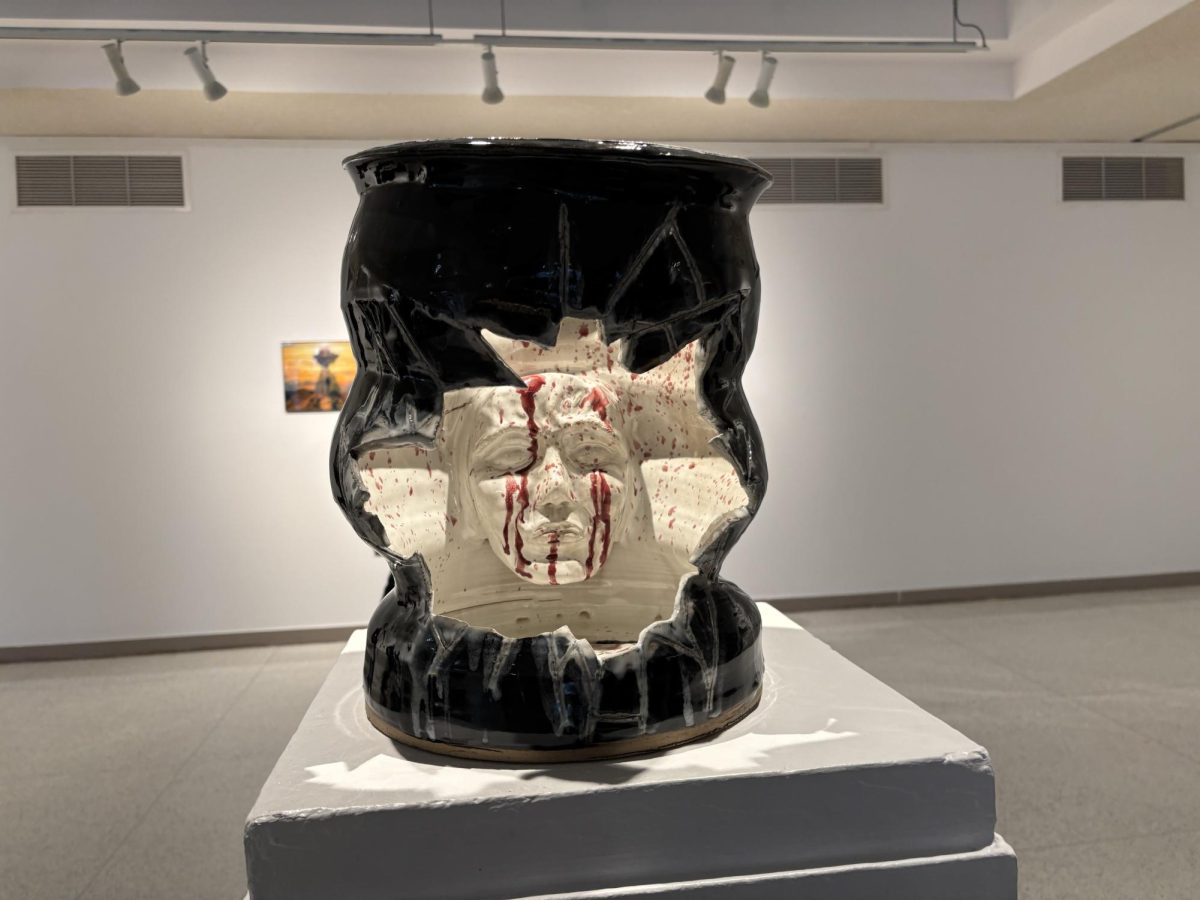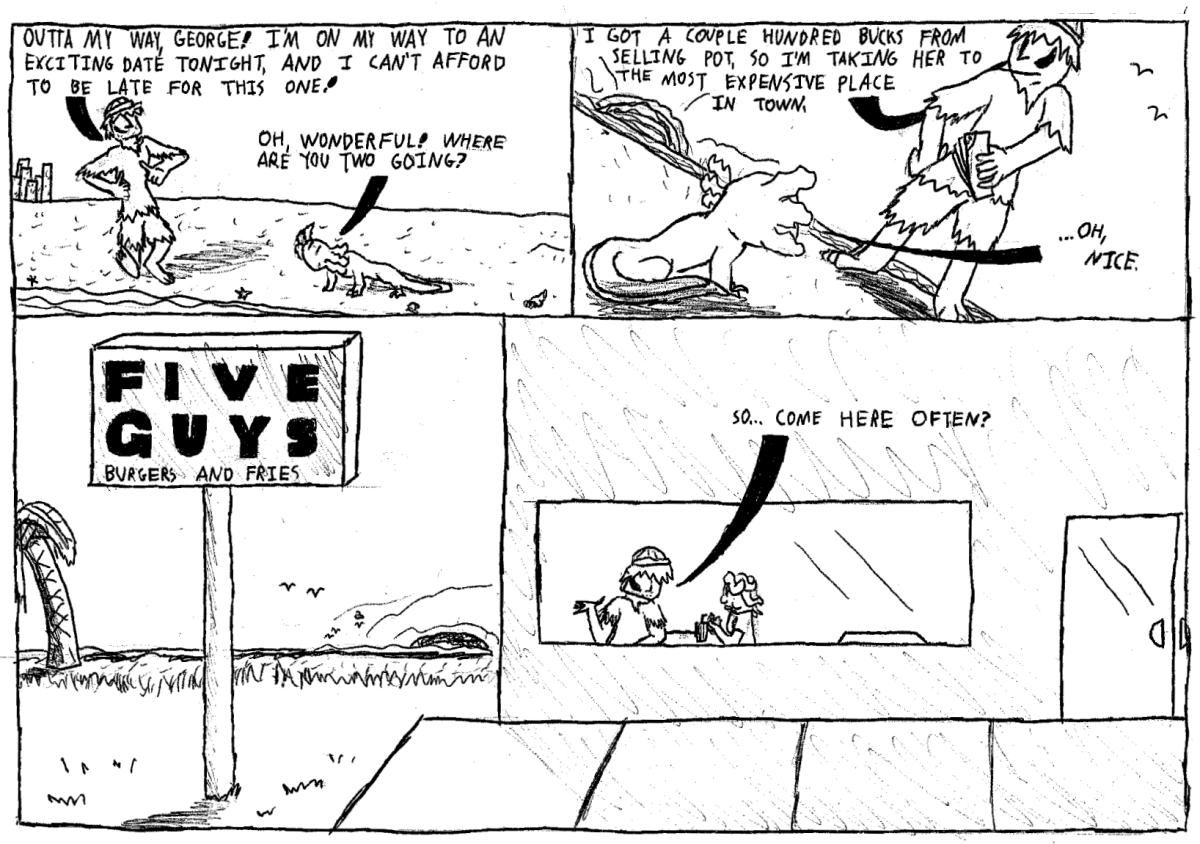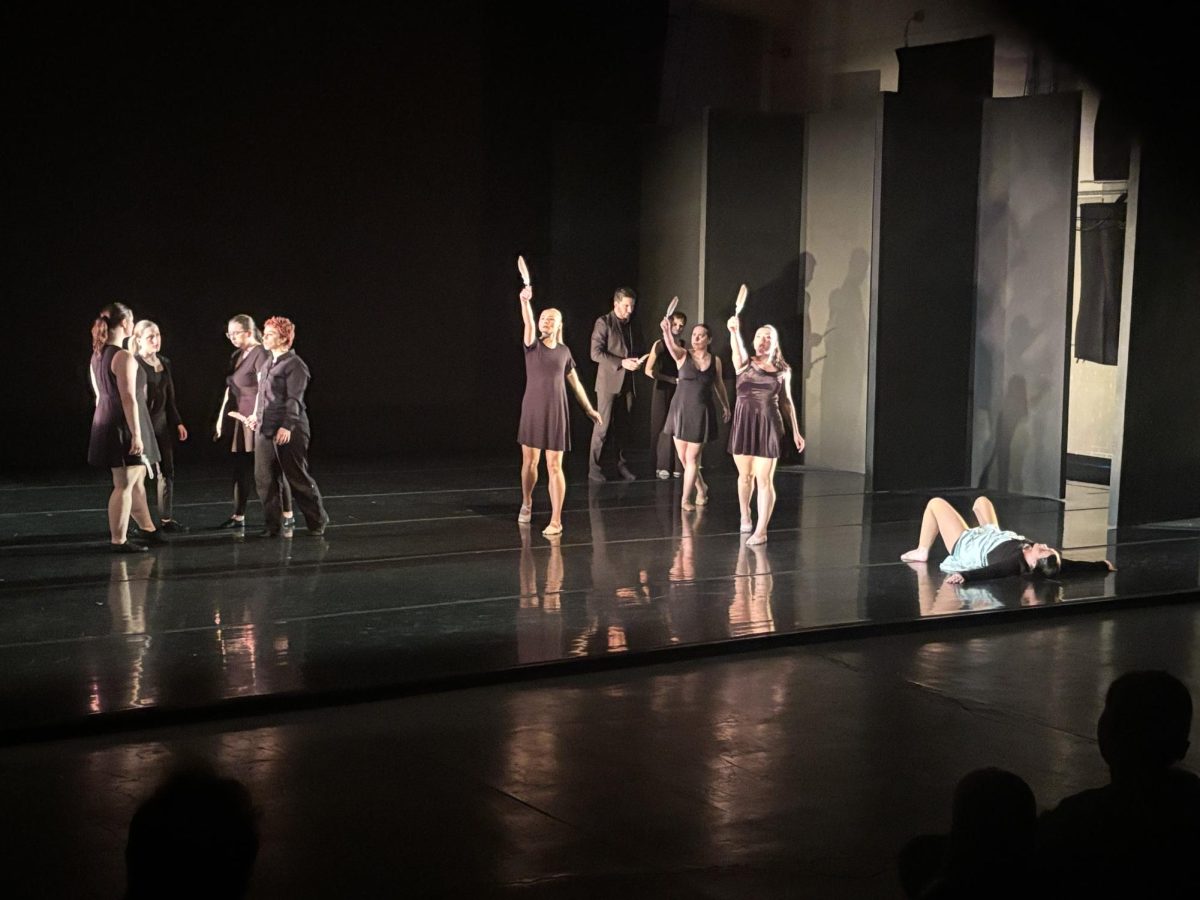
Dannielle Owens-Reid and Kristen Russo of Everyone is Gay speak about equality.
“Out of the thousands of questions that we get from people struggling with their sexuality, hardly any of them have anything to do with sexuality,” said Owens-Reid. “The feelings these people are feeling are the same feelings we’ve all felt before… We’ve all fallen in love with our best friend, and we’ve all had to deal with tremendous heartbreak, and none of our parents really ever figure out how to talk to us.”
Plans for the bloggers’ visit actually began a year ago, but Vice President of Q & A Shannon Wade, ‘13, said she believes their presentation is currently just as relevant to the campus as it would have been last year.
“I think it just ended up working out really well, and it definitely plays into the conversation that’s going on on campus,” said Shannon Wade, ’13. “We were floored by how many people were here…There weren’t enough seats.”
Q & A wanted to open an on-campus discussion on diversity.
“Coming here [to Allegheny], I really saw that there was a lot of disparity between students of multiple identities, and there wasn’t any discussion on privilege, which is something that we all have and hold inside of us,” said Q & A member Nick Gordon, ‘15.
“It’s our responsibility to use that privilege to help others, to bridge that gap and create what democracy constantly strives for, which is equality,”
he said.
Equality is a key tenet of Everyone is Gay’s philosophy. Though their website title may suggest otherwise, Russo and Owens-Reid ultimately strive to provide youth with advice that does not emphasize the importance of sexuality or gender expression.
“The problems and the struggles and the confusions that so many of us face are not different based on who we’re going to bed with,” said Russo during their presentation in Quigley Hall last Wednesday, Oct. 3.
Russo and Owens-Reid started Everyone is Gay as an advice website in 2010, which quickly grew to incorporate video blogs and a phone-in question/answer webcast that’s now posted every other week. Although the site is geared toward LGBTQ youth, the two young women make a point to explain that any and all topics are welcome for discussion.
“It’s not pretentious advice…it’s just really from the heart. I think that’s why so many people relate to it,” Wade said of Everyone is Gay.
Some students weren’t sure what to expect of the presentation, based solely off of the event flier that was posted on various locations around campus with very basic information.
“Unless you knew that it was a presentation, the flier wasn’t attractive to those people who really needed to see it and have their mind opened to it,” said Kerri Barron, ’15. “No one who already has a homophobic mindset would have gone, because nothing draws them in or is explained.”
Russo explained that she and Owens-Reid initially started the website for fun a few years ago, not thinking that many people would be interested in reading it.
“We don’t think everyone is gay,” said Russo. “I know that is a little misleading to a lot of people sometimes.”
Russo used a typical question, about how to come out as gay to one’s own parents, to explain the origin of the website name.
“We say, alright. Everyone’s gay. Everyone’s trans. Just take that out of the equation. What are you really talking about?” she said. “You’re talking about the fact that you want your parents’ approval. Or that you want your friends to understand you.”
“Those are things that we can all identify with,” she said.
The pair’s website actually began with Owens-Reid’s creation of a totally different website entitled “Lesbians Who Look Like Justin Bieber.” Students in Quigley’s overcrowded auditorium burst into laughter when Owens-Reid showed pictures of some of these lesbians on the PowerPoint slide.
Owens-Reid said that strangers actually began asking her some serious questions regarding sexuality when she started her site.
However, she also received some negative comments, from girls who said Owens-Reid was stereotyping and making the entire lesbian community look bad.
“Kristin [Russo], who I’d just met, got all bajiggity and wanted to talk back,” said Owens-Reid, explaining that “bajiggity” means “angry.”
It was at this moment that the two women decided to start an advice website together.
At the time, Russo was pursuing a master’s degree in gender studies and had a lot of information on her mind she wanted to share. She also wanted to help Owens-Reid express to the incensed viewers that she hadn’t meant any harm by her Justin Bieber jokes.
“I basically felt that there were a lot of very angry lesbians who were yelling at Dannielle [Owens-Reid], and she had no place to speak back from,” said Russo.
Although the website began as a joke between the two, it wasn’t long before readers started asking the women some very serious questions.
“We think a big part of why there was such a large response so quickly was because on our website you can actually ask questions anonymously,” said Owens-Reid. “That anonymity gives room for people to ask questions they may otherwise feel uncomfortable or weird asking.”
Everyoneisgay works to eliminate negativity both on and off line. The bloggers recognize that just as human rights can be disrespected in person, so they can be disrespected on the Internet.
“Just because we have this anonymous grey silhouette, a YouTube username nobody knows is ours, doesn’t mean we should just be saying things about other people because we can hide behind those things,” said Russo.
According to Everyone is Gay, an activist’s most crucial tool should be kindness.
“Don’t be a jerk. In real life, or on the Internet. And for some of you, that might be the extent of your change-making. But if you can seriously do that, if you can honestly be a kind person in every aspect of your life…I’m happy,” said Russo.
Above all else, the bloggers’ goal is to steer students away from using systematic labels to describe themselves and others.
“What is it that makes you guys think you need to fit into a category, and then remain in that category forever?” asked Owens-Reid, triggering laughs from the audience.
She went on to note how often the pair receives questions from young people who decide they identify with one form of sexual expression, and later change their minds.
“We end up obsessing over these labels that we completely made up. Straight, gay, lesbian, bisexual, pansexual, transgender, cisgender…everyone, calm down!” said Owens-Reid. “It would be so much easier if we could just love who we love and identify how we identify…no questions asked.”
Russo said that labeling one another based on certain things–our sexuality, our race–is an unnecessary habit that can be at least partially broken.
“We have a really big tendency in this society to create lots of very tiny little boxes, and to put ourselves and other people in those boxes, and it just separates us all that much more from each other,” said Russo.
She acknowledged it is difficult to overcome the consequences of oppression’s inevitable presence throughout world history.
“We’re not gonna sit up here and be like, guys, let’s just forget about that and skip off merrily into a land of rainbows and puppies,” she said. “But we can share a history with other people and be open-minded enough to know this isn’t just about one thing. It isn’t just about gay rights, trans rights or women’s rights.”
Equal human rights in general is the bloggers’ primary focus on human rights. They make an effort not to exclude any particular group from their advocacy.
“If you’re sitting in this room thinking, all right, but I’m not gay, I’m not bisexual, I’m not transgender….I don’t even have a gay aunt. First of all, you probably have a gay aunt. Who doesn’t, right?” Russo said, drawing more laughs from the large group.
“Second of all, if you are a human being, you should feel completely comfortable participating in a movement that is for equal human rights,” she said.
Russo stressed that a wide variety of people, including some parents of youth, post questions and seek advice on the website, whose main readership is comprised of youth between the ages of 13 and 24.
Another important aspect of Everyone is Gay’s campaign is the lack of any specific political emphasis. Owens-Reid and Russo strongly advocate voting, stressing that any kind of voting is better than none.
“We think it’s so important for people to register to vote and to vote, regardless of how you’re voting,” said Owens-Reid in an interview.
She explained that to vote is to help determine outcomes for many of the human rights issues she and Russo are concerned with. At last Wednesday’s event, Obama campaign representatives were seated at the front of Quigley’s auditorium to help attendants register to vote.
“This is an election year, and we thought it was really important to highlight that and to get people registered,” said Russo during an interview.
She added that the duo asks each campus they visit if it has voter registration volunteers.
The night before visiting Allegheny, Everyone is Gay had presented at Clarion University, where representatives from Obama’s Pittsburgh branch had sat at a registration table. Those representatives then volunteered their services for the following night’s performance in Meadville.
Russo said that the previous night at Clarion, 40 attendants had registered to vote. Twenty-four attendants registered at the Allegheny event.
“We keep our political views sort of to ourselves, because we think the more important thing is to tell people that they should be informed and know about things and then use that knowledge to cast a vote,” said Russo.
The portion dedicated to political activism follows the same simple, humorous framework as the rest of their act.
That humor, combined with the interactive quality of the presentation, sprouts from each woman’s undergraduate background in theatre.







